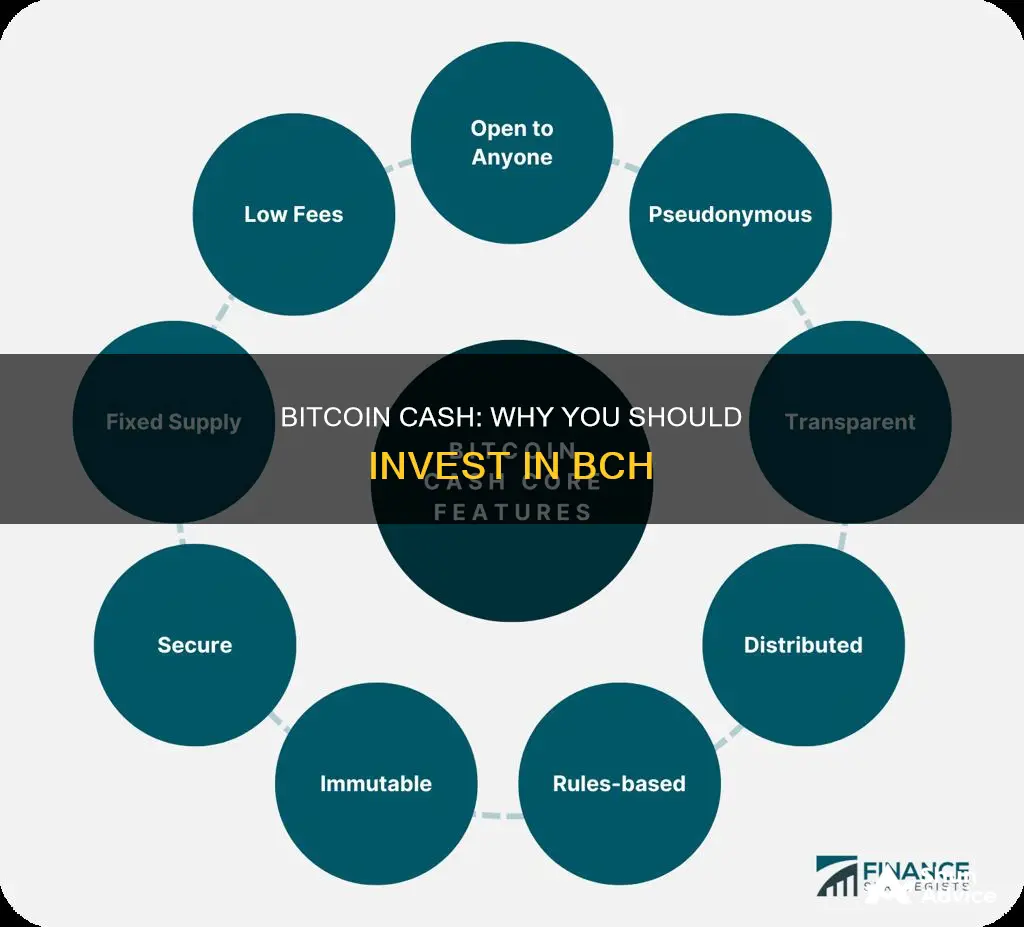
Bitcoin Cash (BCH) is a peer-to-peer electronic cash system that emerged in 2017 as a hard fork of the original bitcoin cryptocurrency. It is designed to address Bitcoin's scalability issues and facilitate everyday transactions. Bitcoin Cash has larger blocks than Bitcoin, allowing for more transactions per second and lower fees. It is also easier to mine and has gained popularity as a medium for daily transactions. With its growing value and wide adoption, Bitcoin Cash offers a great opportunity for investors to diversify their portfolios. However, it is important to remember that investing in any cryptocurrency carries risks and one should always do their research before investing.
What You'll Learn

Bitcoin Cash's faster transaction times
Bitcoin Cash (BCH) is a peer-to-peer electronic cash system that was created in 2017 as a hard fork of Bitcoin. It was designed to improve the scalability of Bitcoin and facilitate everyday transactions and investing.
One of the main differences between Bitcoin and Bitcoin Cash is that Bitcoin Cash has larger blocks than Bitcoin. Bitcoin Cash's block size is 32 MB, 32 times larger than Bitcoin's 1 MB block size. This allows Bitcoin Cash to process up to 116 transactions per second, while Bitcoin can only handle seven.
The larger block size in Bitcoin Cash results in faster transaction times. During a stress test conducted in September 2018, the platform registered 25,000 transactions per block, while the average number of transactions per block for Bitcoin is between 1,000 and 1,500.
Faster transaction times make Bitcoin Cash a more attractive option for everyday transactions. It also makes it more suitable for smaller transactions, such as buying a cup of coffee.
In addition to faster transaction times, Bitcoin Cash also offers lower fees than Bitcoin. BCH users only pay around $0.20 per transaction, compared to higher fees on Bitcoin's blockchain.
The faster transaction times and lower fees of Bitcoin Cash make it a more viable option for daily transactions and a more attractive investment opportunity for those looking to diversify their cryptocurrency portfolio.
The Fool's Crypto Play: Does It Invest in Bitcoin?
You may want to see also

Lower fees
Bitcoin Cash (BCH) is a peer-to-peer electronic cash system that emerged as a hard fork from the original Bitcoin blockchain. One of the primary reasons for its creation was to address the scalability issues of Bitcoin, particularly the high transaction fees and delays caused by network congestion.
Bitcoin Cash achieves lower fees through its increased block size, which allows for a higher number of transactions per block. This strategy increases the network's overall transactions-per-second (tps) rate, enabling Bitcoin Cash to function effectively as a medium for daily transactions. The larger block size ranges from 8 MB to 32 MB, in contrast to Bitcoin's 1MB block size. As a result, Bitcoin Cash users can avoid the high fees associated with Bitcoin transactions.
The increased block size also reduces the need to incorporate the Segregated Witness (SegWit) protocol, which is part of Bitcoin's core coding. By excluding SegWit, Bitcoin Cash further optimises its transactional efficiency.
During a stress test in September 2018, the Bitcoin Cash platform registered 25,000 transactions per block, significantly higher than the average of 1,000 to 1,500 transactions per block for Bitcoin. Additionally, users pay considerably lower fees when using the Bitcoin Cash network, typically around $0.20 per transaction, compared to higher fees on the Bitcoin blockchain.
The lower fees of Bitcoin Cash make it a more attractive option for users looking to conduct daily transactions without incurring high costs. It also contributes to the growing popularity and adoption of Bitcoin Cash as a viable alternative to Bitcoin.
Bitcoin's Long-Term Investment Potential: Smart Move or Not?
You may want to see also

Improved scalability
Bitcoin Cash was created to address the scalability issues of Bitcoin. Bitcoin can only process about seven transactions per second, which is significantly slower than other payment methods such as Visa and PayPal. This inefficiency is due to Bitcoin's small block size of 1 MB, which is added to the blockchain every 10 minutes.
Bitcoin Cash, on the other hand, was designed with larger blocks of 8 MB, later increased to 32 MB. These larger blocks can fit more transactions, increasing transaction verification times and allowing the network to handle more transactions per second. As a result, Bitcoin Cash has improved scalability, enabling more people to execute transactions and payments simultaneously.
The scalability of Bitcoin Cash means it has the potential to handle a growing number of users and transactions. Its high scalability translates to high future potential for adoption, making it an attractive investment option for those who believe in the future of cryptocurrency.
Additionally, the larger block size of Bitcoin Cash leads to lower transaction costs. With increased scalability, validation times and transaction fees decrease. Bitcoin Cash's average transaction fee is $0.008306, compared to Bitcoin's $1.79.
The improved scalability of Bitcoin Cash also contributes to its faster transfer speed. With larger blocks, Bitcoin Cash can record more transactions in each block and make payments faster and at lower costs compared to Bitcoin.
In summary, Bitcoin Cash's improved scalability enhances its efficiency, security, and speed, addressing the limitations of Bitcoin and positioning it as a promising investment opportunity in the cryptocurrency market.
Cryptocurrency Investment: Safe or Risky Business?
You may want to see also

Increased block size
Bitcoin Cash (BCH) is a cryptocurrency that was created in 2017 as a result of a "hard fork" from the Bitcoin blockchain. This fork occurred due to a philosophical debate on how to handle Bitcoin's scalability concerns.
Bitcoin Cash's increased block size is a key feature that sets it apart from Bitcoin. The block size was increased to a limit of between 8 MB and 32 MB, allowing for more transactions to be processed per block. This increase in block size was proposed to address the scalability issues encountered on Bitcoin's blockchain, where transaction times and fees had increased due to network congestion.
The larger block size in Bitcoin Cash allows for a higher number of transactions per second, reducing fees and delays for users. During a stress test in September 2018, the platform registered 25,000 transactions per block, compared to the average of 1,000 to 1,500 transactions per block for Bitcoin.
The increased block size also makes Bitcoin Cash cheaper to use. BCH users pay significantly lower fees per transaction compared to Bitcoin's blockchain. Additionally, the larger block size makes Bitcoin Cash easier to mine than Bitcoin.
While increasing the block size was a controversial decision, as it changed the core protocol of Bitcoin, proponents of Bitcoin Cash believed that it was necessary to provide daily Bitcoin users with efficient and affordable transaction services.
The Best Time to Invest in Bitcoin
You may want to see also

Decentralised, peer-to-peer digital cash
Bitcoin Cash (BCH) is a peer-to-peer electronic cash system that emerged from a hard fork of the original Bitcoin blockchain. It was created in response to the scalability issues encountered on Bitcoin's blockchain during the 2017 crypto craze, where transaction times and fees increased due to network congestion.
Bitcoin Cash addresses these issues by increasing the block size, allowing for more transactions per block and improving the network's transactions-per-second (tps) rate. This makes it faster and cheaper to use than traditional Bitcoin, and easier to mine.
One of the primary advantages of Bitcoin Cash is its ability to facilitate near-instant, low-cost transactions globally. With Bitcoin Cash, users can send money to anyone, anywhere in the world, at any time, without the need for intermediaries or third-party approval. This makes it a truly decentralised, peer-to-peer digital cash system.
Additionally, Bitcoin Cash provides users with greater control over their funds. It eliminates the risk of capital seizure by banks or governments, as seen in the case of bail-ins in Cyprus and Greece. It also removes the possibility of banks blocking transactions, charging unexpected fees, or freezing accounts.
Another key feature of Bitcoin Cash is its scarcity. The Bitcoin Cash protocol ensures a fixed supply of 21 million coins, in contrast to governments constantly printing money and devaluing savings. This scarcity contributes to its potential as a store of value.
The Bitcoin Cash community is also vocal and active, continuously working on updates and improvements to the protocol. This includes enhancements to the decentralised development of the network, ensuring its resistance to political and social attacks and control by a single group or project.
In summary, Bitcoin Cash offers a range of benefits as a decentralised, peer-to-peer digital cash system, including fast and inexpensive global transactions, user control, scarcity, and a strong community driving innovation and development.
Bitcoin Mining: Where to Invest Your Money?
You may want to see also
Frequently asked questions
Bitcoin Cash is a peer-to-peer electronic cash system that was created in 2017 as a hard fork of Bitcoin. It is designed to address Bitcoin's shortcomings and scalability issues, with eight times larger blocks than Bitcoin, allowing for faster and cheaper transactions.
Bitcoin Cash offers faster transaction times, lower fees, and better scalability than Bitcoin. It is also a way to diversify your portfolio and gain exposure to the cryptocurrency market. Additionally, Bitcoin Cash has a large community of supporters and an active development team that continues to add new features and improvements.
To start investing in Bitcoin Cash, you need to sign up with a cryptocurrency exchange that allows you to buy and sell Bitcoin Cash. You can then purchase Bitcoin Cash using fiat currency or other cryptocurrencies. It is important to do your research and choose a reliable exchange, such as eToro.
Yes, investing in any cryptocurrency carries risks. The value of Bitcoin Cash can be volatile and affected by various factors such as market sentiment, crypto news, and tech innovations. Additionally, there are security risks associated with storing and trading cryptocurrencies. However, compared to other cryptocurrencies, investing in Bitcoin Cash may be safer due to its strong community support, active development team, and wide adoption.
The future price predictions for Bitcoin Cash vary, with some forecasters expecting it to reach as high as $10,000 by 2030, while others predict a more modest price range of $700 to $900 by 2025. It is important to note that cryptocurrency price predictions are highly speculative and subject to change.







